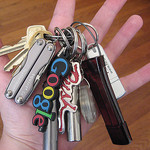 Key Clutter….Got A Lot Of Unnecessary Keys and other Paraphernalia on Your Key Chain?
Key Clutter….Got A Lot Of Unnecessary Keys and other Paraphernalia on Your Key Chain?
Lighten Your Load For 2014
This Christmas my most “life changing” gift was the smallest one. I now have a new keychain with exactly three keys on it: 1. My house key, 2. My Car key, 3. My office key. Additionally, my keychain sports a small LED flashlight, and a remarkably small, sharp, pocketknife. My keys and my “tools” are all I need to negotiate my daily life. Yet, somehow, for many years now I’ve been weighed down with a gazillion unnecessary keys. They have added weight and bulk to my purses, my coats, and my psyche. The process of “key shedding” for me has been highly symbolic and representative of a sea change in the “shedding” of many things in my life that no longer serve. Here’s how it happened.
A Key Inventory
After taking all of my keys off the key chain, I did a quick inventory. Here is what I found: 1. 3 keys to cars I no longer own, including keys to my adult daughter’s cars that are long since gone. 2. 2 keys to file cabinets that I no longer have. 3. 4 keys to doors in offices that I have no connection to at all. 4. 3 keys that I can’t even identify at all. Some of these keys had some sentimental value and brought with them memories, so I didn’t throw them out, but I took them off the key chain.
What’s Up With All The Keys?
In my view, keys have all kinds of meanings. Keys open doors to houses, offices, and other private places. Keys represent security and ownership. Car keys have to do with autonomy and freedom. When my daughters first learned to drive I always had copies of their car keys because I felt I needed access in case they got into trouble or lost their keys. In retrospect I can see it was a form of control as well. I kept these keys way too long because it was hard to let go.
Keys Represent Identity
What I have come to believe is that each of my keys represents a part of my identity. I have a house key. Therefore I’m a homeowner. When I bought my first house this key conferred power and prestige to me. A car key means I’m also a car owner. My office key allows me a private inner sanctum where I do my work. Homeless disenfranchised people don’t have keys, so they don’t have this identity. I noticed that when I went from 12 keys to 3 keys I initially felt kind of lost and powerless. Weirdly the heft and weight of my keys actually gave me this feeling of substance and importance
Shedding Keys Means Shedding the skin Of Old Identities
I don’t need keys to cars I don’t own or have access too, so these were the first keys to go. My daughters are grown and responsible for their own safety and transportation. There goes that identity. I only have one house and one office. All the other office keys finally got tossed, and I realized I kept them on the keychain because I still felt sentimentally attached to where I used to work. In some small way I was still attached to my younger identity. That’s why I kept the key. Maybe I even had an unconscious belief I might want to go back to my old job. I usually only drive one car. I have access to another but I don’t need the key with me all the time. I don’t need the security of having that second car key with me. I used to think I did. It was like I felt I needed a “backup” car.
Now that I’ve downsized my key chain I feel that my identity is light, fluid, and ever changing. It feels like I don’t anymore need so many small talismans that tie me to the material world and remind me that, yes, you are safe. You have a place to live, a way to get around, and a job. That feeling now resides within me.
Do You Have Anything To Shed?
As 2013 draws to a close, it seems like a good time to think of shedding anything in your life that belongs to a previous version of you. I’m also looking at clothes, dishes, bedding, and furniture that is no longer reflective of my present self. I don’t want things that are too big, or too small, too shabby or too youthful. Similarly, I’m looking at belief systems that no longer serve….whole ways of looking at the world in fact, and even people who used to be a part of my life… but its time to let some of them go too.
The up side of this is that life will always come in and fill in the void that is created when something is taken away… even in those times when you cling desperately to the way things are and don’t want them to change. I don’t know why this works, but I believe that it does. Just…be open. Listen and watch for new life to grow in those fallow fields….It will happen.


